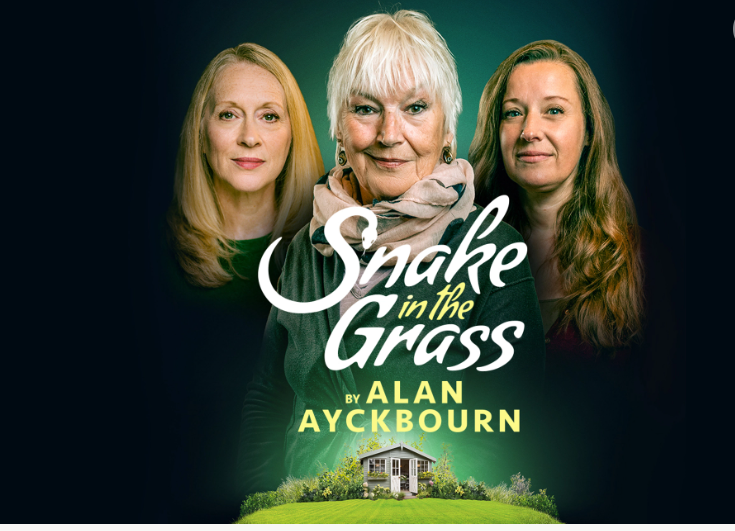Snake in the Grass
Fri 13 Sept – Sat 5 Oct,
Dundee Rep Theatre
As theatre sub-editor for DURA, it feels strange to confess that, up until recently, I’d never seen an Ayckbourn production. I’d read his non-fiction book, The Crafty Art of Playmaking, but never watched a single one of his ninety plays. I’m glad my first Ayckbourn was with Dundee Rep; I knew I would be in safe hands. And sure enough, their production of Snake in the Grass, directed by Andrew Panton, is, by equal measure, both comedically and chillingly tense.
Snake in the Grass has an all-female cast, with the Rep’s production starring Deirdre Davis as Annabell Chester, Emily Winters as her younger sister Miriam and Ann Louise Ross as their late father’s nurse, Alice. When the career-driven, strong-willed Annabell returns from Australia to the English estate of her estranged, deceased father, she finds the working-class nurse, Alice, waiting for her. Alice possesses evidence that Miriam, the timid and sweet younger Chester sister who stayed home to care for their aging father, was in fact his killer; and she plans to blackmail the two sisters for money with the fact. Only, as the title suggests, nothing in this play is as it first appears. All three women have secrets, and the Chester estate is full of hidden dangers.
The play is predominantly about power. We see it in the costuming: in Davis’s tight braids and crisp pantsuit when Annabell first arrives, authoritative, modern and perfectly composed; in Ross’s brightly exuberant scarf when Alice believes she has the upper hand; and in Miriam’s shift from creased, oversized shirts to an oily black macintosh. The power of the Chesters’ father is felt even in his absence: in the once-grand summer house, disused but domineering, with its empty rocking chair still waiting watchfully on the porch; and in the looming fence and shadowy depths of the tennis court. These two sites of childhood abuse flank the stage – and the sisters – on either side. An arrangement of ivy climbers at the back let Alice sneak in and out of the garden as she chooses, often lingering to eavesdrop. The use of levels and forced perspective cleverly expands the space, creating an illusion of depth, and it’s easy to believe that we are seeing only a small portion of a much larger space. And centre-stage of course is the well, introduced early in act one and just waiting to be used.
Writing-wise, the thriller’s twists and turns are well-seeded. Some are foreseeable very far in advance, but more often this reviewer felt rewarded for being attentive than let down by predictable writing. The journey the characters are on is far more interesting than their destination, which feels inevitable almost from the start. There is a sense almost of dramatic irony, adding to both the comedy and the intrigue; we see the trap closing in on the characters long before they do. Slower, more intimate moments don’t offer catharsis but instead ratchet up the tension. And punctuating these are even a few honest-to-god jumpscares to vary the pace.
The performances of all three actresses are stunning. They exchange volleys of needling barbs and pithy rejoinders in a way that is never exhausting to watch, even when the characters themselves are exhausted of each other. The shifting power struggle between the three women is evident not just in their words but in their physicality too, in their distance and sometimes claustrophobic closeness to one another. Ross shows off her talent for physical comedy, and Davis’s gradual unravelling as Annabell is haunting. It is Winters, however, who is most mesmerising as Miriam. From the moment she enters, frazzled and put-upon, her almost childlike energy is instantly endearing. As the story unfolds however this energy shifts, first subtly and then all-too-suddenly, into something far more sinister.
With brilliant dialogue, excellent pacing and a few cunning twists, Snake in the Grass is an eerie and highly entertaining dark comedy thriller. Where this production really shines is in the performances of its three leads, who each play both the scheming and vulnerable depths of their characters with remarkable talent.
Kai Durkin


Leave a Reply